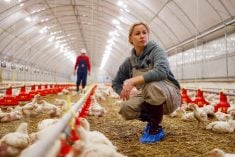A company that hoped to build a cellulosic ethanol plant in Western Canada is shifting its focus to Brazil.
Iogen Energy is pursuing a joint venture with Brazilian ethanol giant Raizen Group to build a facility that will convert sugar cane bagasse into ethanol.
Bagasse is the plant material left over after the sugar is squeezed out of the cane.
Iogen and its business partner, Royal Dutch Shell, announced in April they were scrapping plans to build a 40 million litre facility in Portage la Prairie, Man. that would have used Iogen’s technology to make ethanol out of cereal straw.
Read Also

B.C. ostriches culled, CFIA confirms
Ostriches on an embattled Edgewood, B.C. farm have been culled after a prolonged legal battle, the Canadian Food Inspection Agency has confirmed.
Six months later, Raizen Group, the world’s largest producer of sugar cane ethanol, is making an initial investment toward developing a commercial cellulosic ethanol plant in Brazil using Iogen’s technology.
The unspecified investment will cover the development and engineering costs for designing a facility that will be co-located with one of Raizen’s ethanol plants in Sao Paulo, Brazil.
“We believe Iogen has one of the most robust, well proven and competitive technologies in the cellulosic ethanol business,” Vasco Dias, chief executive officer of Raizen, said in a press release.
Raizen is a $12 billion 50/50 joint venture between Shell and Cosan S.A., a Brazilian ethanol firm. The venture gives Raizen the rights to use Iogen’s technology because Shell is part owner of Iogen.
Raizen produces 2.2 billion litres of sugar cane ethanol annually that it sells at its 4,500 fuel service stations in Brazil.
“We’re excited to be working with a major ethanol industry player like Raizen,” Iogen chair Brian Foody said in the press release.















